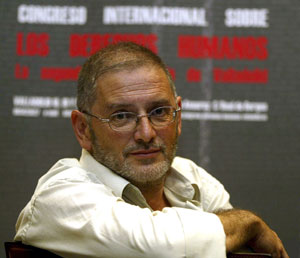

Abstract:
In this article, the writer discusses a new method which Israel has adopted to demolish Arab homes in Occupied Jerusalem – the use of the Municipal Bye-Law for Conservation of Order and Cleanliness. This method is quicker and easier to implement than long and tiresome judicial proceedings which would have to be undertaken if the homes were demolished under national laws. By removing the cloak of the need for Conservation of Order and Cleanliness, Margolit exposes the actual underlying racist reason for the demolitions. This article was translated from Hebrew by George Malent
It could have been just another demolition order story, resembling thousands the Jerusalem Municipality routinely issues in the east of the city. But this one inadvertently exposed the moral deterioration Israeli society is undergoing, under the cover of national conflict.
The Jadua clan has lived In Anata, north-east of the city, since the ’80s, part of the Jahalin tribe of nine families, many of whom have Israeli ID cards. The older ones were born in the Arad area in the Negev, from where they were expelled in the 1950s. The Jerusalem Municipality has issued them with an unusual order for eviction and demolition, which, instead of being based on the Planning & Construction Law like all other demolition orders, is based on the Municipal Bye-law for Conservation of Order & Cleanliness, whose original purpose was to clear public spaces of discarded garbage.
At first, I thought those two appalling orders were nothing but the whim of a hyperactive municipal clerk, drenched in Arab-hatred, eager to prove his diligence to his superiors. I was convinced after the Bedouin’s legal representative, Attorney Shlomo Lecker, submitted a reasoned appeal that the judiciary, usually saner than the municipal bureaucracy, would quietly withdraw from this accursed exercise. But to my surprise, the judiciary sent the court a response confirming its right to use that bye-law, while trying to prove that this initiative is consistent with the letter of the law.
The municipality’s response was astonishing: written in dry, meticulous, technocratic legalese, fragrant with the colonialist odour of those who are convinced that they have justice in their pockets. It is full of quotes from other, out-of-context legal rulings, making assertions totally different from the supporting precedents it invokes. So, for example, if a Tel Aviv judge permitted the removal of Israel Tvito’s protest camp in the central park of Tel Aviv using that same municipal bye-law, because technically protest tents do not constitute “dwellings,” the Jerusalem Municipality has eagerly seized on that ruling, torn it out of context and brazenly claims in this case that tents are also involved, so there is no reason not to adopt that same ruling and treat the Bedouins as the Tel Aviv Municipality treated anti-poverty protestors.
The municipality’s position works on three levels: firstly, it claims that the huts and tents in which the Bedouins live cannot be considered “houses” and therefore should be treated as discarded junk. Secondly, it claims that even if those huts or tents are considered “houses”, they were erected without permits on open public space, for which no permit can be issued since there is no municipal zoning plan and so the Bedouins are intruders, whose structures may be demolished. Thirdly, that there is no place for a Bedouin tribe in the capital of Israel.
Each of the three principles is interesting on its own merits, for the distorted logic contained therein. The first principle, which emphasises that the structures cannot be considered “dwellings”, reflects an evil mindset, or at best, an ignorant one. Evil, because the ruling’s internal logic is that if the tin huts of the Bedouin are “discarded junk,” then the people who live in them are a kind of “garbage”; and ignorant because it disregards the fact that every culture has developed a unique way of life. A hut or a tent is a legitimate dwelling in Bedouin culture, no less than a penthouse in Western society. The municipality’s presumption to define what can reasonably be called a “dwelling” is not only small-minded and distorted but characterises its approach to every Palestinian issue in the city – patronising, arrogant and contemptuous, presuming to determine not only what may reasonably be called a “dwelling”, but also what are appropriate cultural norms and values.
The second principle – that even if they were buildings, according to the Planning & Construction Law, even the erection of huts and tents requires a building permit, not issued to the Bedouin residents because the area is not in the zoning plan – is not only problematic but also shameful. The municipality announced that the area is outside the plan, despite the fact that it has been under its jurisdiction for over 40 years; so, the municipality is in violation of the law obliging local authorities to issue plans for all lands under their jurisdiction within a reasonable time-frame. Moreover, the decision is inconsistent with other recent, opposing judicial precedents, such as that of Justice of the Peace Daniel Fisch in Haifa, or District Judge Michal Agmon in Tel Aviv, who ruled that in a place where the local authority has been negligent and not prepared a plan, residents must not be held responsible, and the law should not be enforced against them if the municipality itself is disobeying the law.
The third principle actually addresses the essential point. Someone in the municipality decided there is no place for Bedouins in the capital city of Israel. And that point merits a great deal of attention. First, who decided that? And who is authorised to decide who is allowed to live in the city and who is not? Why is a Bedouin encampment forbidden in the capital of Israel while a refugee camp with 11,000 residents is permitted in Shu’afat, shaming the city not only by its presence but also by the municipality’s effort to ignore it as if it did not exist? And why is a Bedouin encampment forbidden in the capital of Israel while neighbourhoods of disgraceful poverty like those on Hanurit, Stern or Hevroni Street are allowed to exist in the heart of the city? The more important question is: if today Bedouins are forbidden to live in the city, who will guarantee that tomorrow a mayor will not emerge who will claim that homosexuals, African refugees, foreign workers, or simply Christians, Muslims or even leftists are forbidden to live in the capital of Israel? A ruling that seeks to expel any specific sector from the city is racist by definition. And after all, who is more qualified than the Jewish people to recognise that as the essence of racism?
The city’s response makes one astonished at the shamefulness. One’s instinctive reply is to say rhetorically – “How dare they, for God’s sake!” On reflection, perhaps there is nothing new here. After all, dispossession has accompanied us since our first day here. The phenomenon of the “light hand on the keyboard” that is widespread in government service, is nothing other than the bureaucratic equivalent of the phenomenon of the “trigger-happy finger” widespread in the Occupied Territories, except that what used to be written in the past with a trembling hand is now written with a light hand – or more precisely, with a heavy foot.
The municipality obstinately uses that accursed regulation not only because it is easier to demolish and expel Arabs from their land by means of a municipal bye-law than by a long and tiresome judicial proceeding requiring an indictment and countless deliberations in court; but also because the municipality wants to set a judicial precedent permitting expulsion of Bedouins from their land through a quick and economical procedure, not only in Jerusalem but throughout the entire State.
The ignominy is entirely contained in this point. The way a governmental body makes administrative use of a law to harm human beings reminds one of other dark regimes and periods in history in which expulsion and murder were committed with legal backing and in the name of public order. Maybe this injustice can be defended from a judicial perspective; but morally, absolutely not. It is clear to all those who have not lost their humanity that this is clearly an immoral act, over which a black flag flies.

Copyright © 2005 Palestine Internationalist
source: Volume 4 Issue 1, http://www.palint.org/article.php?articleid=57
The opinions expressed on this site, unless otherwise stated, are those of the authors.